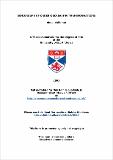Files in this item
Semigroups of order-decreasing transformations
Item metadata
| dc.contributor.advisor | Howie, John M. (John Mackintosh) | |
| dc.contributor.author | Umar, Abdullahi | |
| dc.coverage.spatial | 115 | en_US |
| dc.date.accessioned | 2012-06-21T13:40:02Z | |
| dc.date.available | 2012-06-21T13:40:02Z | |
| dc.date.issued | 1992 | |
| dc.identifier.uri | https://hdl.handle.net/10023/2834 | |
| dc.description.abstract | Let X be a totally ordered set and consider the semigroups of orderdecreasing (increasing) full (partial, partial one-to-one) transformations of X. In this Thesis the study of order-increasing full (partial, partial one-to-one) transformations has been reduced to that of order-decreasing full (partial, partial one-to-one) transformations and the study of order-decreasing partial transformations to that of order-decreasing full transformations for both the finite and infinite cases. For the finite order-decreasing full (partial one-to-one) transformation semigroups, we obtain results analogous to Howie (1971) and Howie and McFadden (1990) concerning products of idempotents (quasi-idempotents), and concerning combinatorial and rank properties. By contrast with the semigroups of order-preserving transformations and the full transformation semigroup, the semigroups of orderdecreasing full (partial one-to-one) transformations and their Rees quotient semigroups are not regular. They are, however, abundant (type A) semigroups in the sense of Fountain (1982,1979). An explicit characterisation of the minimum semilattice congruence on the finite semigroups of order-decreasing transformations and their Rees quotient semigroups is obtained. If X is an infinite chain then the semigroup S of order-decreasing full transformations need not be abundant. A necessary and sufficient condition on X is obtained for S to be abundant. By contrast, for every chain X the semigroup of order-decreasing partial one-to-one transformations is type A. The ranks of the nilpotent subsemigroups of the finite semigroups of orderdecreasing full (partial one-to-one) transformations have been investigated. | en_US |
| dc.language.iso | en | en_US |
| dc.publisher | University of St Andrews | |
| dc.rights | Creative Commons Attribution-NonCommercial-NoDerivs 3.0 Unported | |
| dc.rights.uri | http://creativecommons.org/licenses/by-nc-nd/3.0/ | |
| dc.subject.lcc | QA171.S3U6 | |
| dc.subject.lcsh | Group theory | en_US |
| dc.subject.lcsh | Representations of groups | en_US |
| dc.subject.lcsh | Group theory--Problems, exercises, etc. | en_US |
| dc.title | Semigroups of order-decreasing transformations | en_US |
| dc.type | Thesis | en_US |
| dc.type.qualificationlevel | Doctoral | en_US |
| dc.type.qualificationname | PhD Doctor of Philosophy | en_US |
| dc.publisher.institution | The University of St Andrews | en_US |
This item appears in the following Collection(s)
Except where otherwise noted within the work, this item's licence for re-use is described as Creative Commons Attribution-NonCommercial-NoDerivs 3.0 Unported
Items in the St Andrews Research Repository are protected by copyright, with all rights reserved, unless otherwise indicated.


